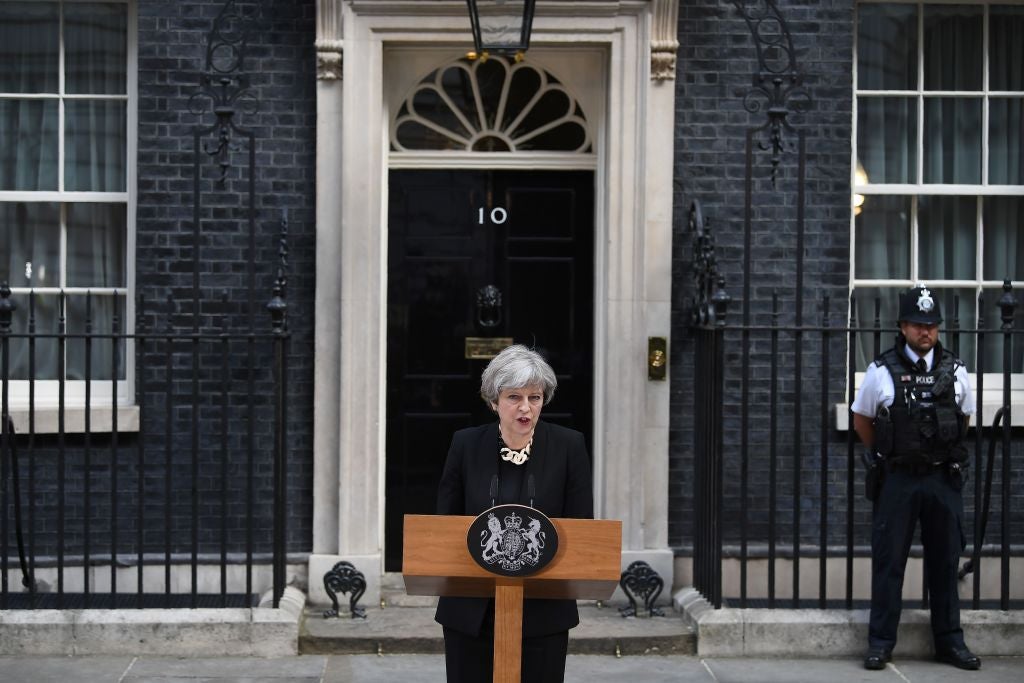Theresa May's speech may have reassured the public, but the measures proposed don't stand up to scrutiny
The Prime was right to say things need to change, but should be wary of rushing into ill-conceived legislation

In her strong response to the horrific terrorist attack at London Bridge, Theresa May was right to assert that the general election will go ahead on Thursday. Postponing it would have amplified the already severe impact of the atrocity, and allowed the terrorists to derail our democracy as well as the many lives affected by Saturday night’s terrible events.
After the third terrorist act in Britain in 73 days, it was understandable that the Prime Minister felt the need to issue an “enough is enough” message. Most people would agree. But in trying to reassure an anxious nation, she should not rush into ill-conceived legislation or measures that could prove counterproductive.
While insisting that “things have to change,” Ms May’s statement was short on detail. Before announcing firm proposals, she should remember the infamous 12-point plan rushed out by Tony Blair after the 2005 London Tube and bus bombings. Mr Blair, too, declared that “the rules of the game have changed”. But his package was widely seen as a kneejerk response and several of the measures were dropped.
Parliament rejected his proposal to detain suspected terrorists without charge for up to 90 days. Ms May raised the possibility of longer prison sentences, yet it is unlikely that terrorists or even their accomplices or friends would be deterred by such a prospect.
She rightly addressed the very real issue of how the internet is used to encourage extremism and terrorism. There is more that the big technology companies could do to quickly remove such material; they should be fined if they decline to do so.
Ministers already wanted to stop end-to-end encryption on services such as WhatsApp following the Westminster attack in March, and will doubtless step up their demand now. However, the Government should proceed with care; terrorists could easily switch to other messaging apps or even create their own. As Ms May acknowledged, preventing abuse of the internet requires international agreement.
Some saw the Prime Minister’s words about tackling “safe spaces” for Isis abroad as a hint of further British military involvement in Libya, Iraq, Syria or Afghanistan. But before any future actions, the UK must learn the lessons of its past failures, particularly the need to plan properly for the aftermath.
Ms May argued that there is “far too much tolerance of extremism” in Britain, and said “some difficult and often embarrassing conversations” would be required in communities. Ministers insist that the Prevent deradicalisation strategy has had some great successes. Yet there is evidence that it has lost the confidence of many Muslims, who feel spied on. The achievements of the programme should be built on, but it must be radically reformed. The reaction of many Muslims to the Manchester Arena attack showed the goodwill in their community; the Government must work overtime to ensure the successor strategy to Prevent does not alienate Muslims. To reassure them, the crackdown against hate speech should be accompanied by tougher measures against hate crime.
Ms May did not mention possible measures such as a return to control orders or the internment of potential terrorists, as some people advocate. She is right to review counter-terrorism strategy in the light of the new threat of copycat low-tech attacks involving vehicles and knives. But she needs to recall that internment was counterproductive in Northern Ireland in the early 1970s.
The review will inevitably look at the resources available to the security and intelligence services. The impact of losing 20,000 police officers since 2010 – on community policing, and the number of armed officers in cities outside London -- must not be off limits just because the policy is so closely associated with Ms May’s time as Home Secretary.
Of course, it would be best to secure all-party agreement on any new measures, although there is little prospect of a consensus between Ms May and Jeremy Corbyn. In the short term, while security will obviously be debated in the last few days of the campaign, what was once seen as “Brexit election” should not become a “security election”. Voters should remember that they are choosing a government for the next five years, and think about the economy and public services as well as Brexit and security.
Join our commenting forum
Join thought-provoking conversations, follow other Independent readers and see their replies
Comments
Bookmark popover
Removed from bookmarks